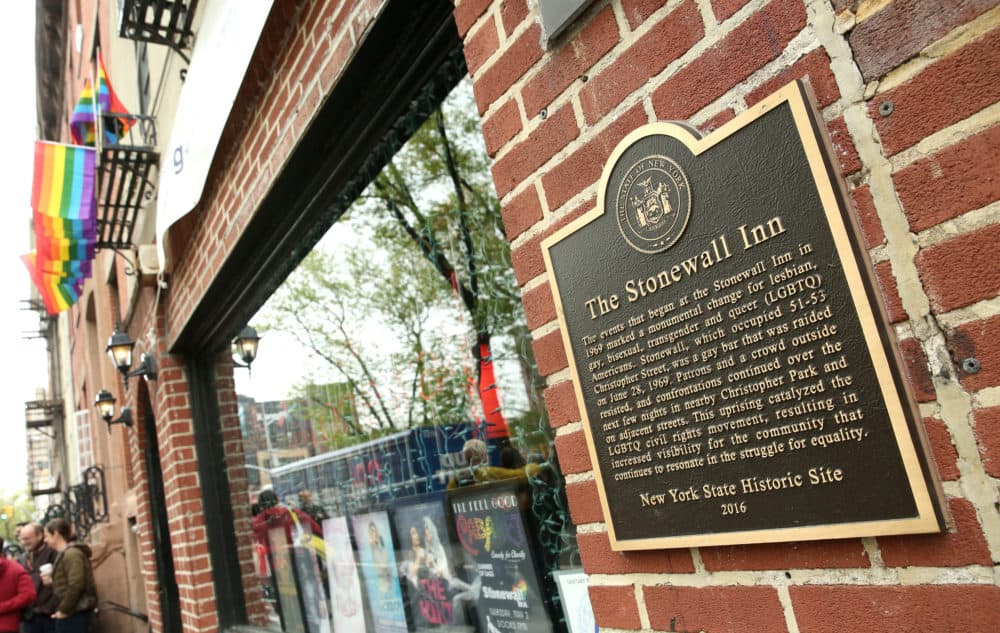Advertisement
'Indecent Advances' Chronicles Violence Gay Men Experienced Before Stonewall Riots
Resume
It seemed historically apropos to meet the author of "Indecent Advances: A Hidden History of True Crime and Prejudice Before Stonewall" at the actual Stonewall Inn.
Riots at the Greenwich Village gay bar 50 years ago brought momentum and visibility to the gay liberation movement, after decades of discrimination and violence. James Polchin’s new nonfiction book takes a close look at a certain kind of violence: the murder of gay men in circumstances that allowed their attackers to claim their homicide was justified.
“The other man came on to me,” Polchin says, explaining how the perpetrators would testify in court. “I had to defend myself. It was an indecent proposal. I had to kill him.”
"Indecent Advances" traces the history of so-called homosexual panic, starting in the 1920s, when gay men were classified as sex criminals, and lumped with rapists and pedophiles. Just being gay could land a man in jail. “You have to remember sodomy was a criminal offense – a felony in 50 states at the time,” Polchin says.
A closeted life felt like the only option to most of the men meeting furtively at places like the bar at New York’s Hotel Astor, or less-safe spaces such as gay bars (often owned by the Mafia and raided by police) or public cruising areas. Gay men from smaller towns visited urban areas such as New York, Los Angeles or Chicago on business, but also, fleetingly, to be themselves.
These men were vulnerable. A man who picked up other men and took them to his hotel, apartment or rooming house might be robbed, extorted, beaten, even murdered. Sensational articles about "The Torso Killer" and The Back Bay Killer" traded on the murders of closeted gay men. Reading between the lines was necessary, but such details as “a pink pillowslip” looped around a victim’s neck, a murderer as a "nattily dressed hanger-on in Broadway circles" or the bondage in which victims were sometimes found, these stories normalized a sense of depravity and horror around homosexuality. In fact, they were the only stories about gay life appearing regularly in the press, according to Polchin.
One example was a 1944 crime story involving a soon-to-be famous beat poet in a minor role. Polchin says the first time Jack Kerouac's name ever appeared in the newspapers was when he served as a material witness for a friend, Lucien Carr, who killed an older man who was part of their sexually fluid circle of artists and writers.
“After stabbing him to death, [Carr] pushed the body into the Hudson River,” Polchin explains. Kerouac then helped Carr get rid of evidence, including the knife, and assisted Carr with his defense — that Carr was protecting himself from improper advances.
Polchin unearths other stories in "Indecent Advances," including those of men whose families decided not to press charges against their killers, because doing so would've essentially outed the victims as gay.
“Those cases—and there are a few of them in the book – really hurt,” he says. “Because I understand why the family would do that. I understand why they wouldn’t want their son to be put in the newspapers as a criminal – as a homosexual. But to read of those kind of cases where the families would let the killers of with a much lesser plea is really hard.”
Coverage of these murders usually centered on the assailants, so Polchin focused much of his research on the men who were killed. He looked not just at the biggest newspapers, but the African-American press, when victims and assailants were black, and he traveled to the smaller towns where some of the victims he learned about were from.
"So I wanted to go to the hometown papers; I wanted to go to the newspapers where some of the victims grew up," he says. "And often they would portray the crime differently because it was their hometown child."
"Indecent Advances" is a memorial of sorts to these forgotten gay men who were routinely failed by the legal system, and to those who loved them. Of course the 50th anniversary of Stonewall should be a celebration, Polchin says, but it's also a time to remember a shocking and heartbreaking past.
This segment aired on June 28, 2019.